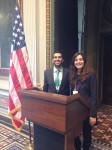UCLA undergraduate student government leaders traveled to Washington, D.C., on Thursday night to attend a conference set up by the White House task force created to protect students from sexual assault.
Undergraduate Students Association Council Student Wellness Commissioner Savannah Badalich and Internal Vice President Avi Oved attended the conference. The event brought sexual assault awareness advocates and government officials together with web designers, mobile application developers and coders to discuss methods to use technology to better help survivors report their assaults and find counseling resources.
Badalich talked with the Daily Bruin about the task force.
Daily Bruin: While you were in Washington, D.C., did you discuss specific UCLA concerns about sexual assault awareness or national trends?
Savannah Badalich: Both. A lot of the things happening at (UCLA) are happening at other universities as well. I was very vocal about the fact that UCLA was seen as one of the most dangerous schools in the nation because we have a lot of (sexual assault) reports. But 14 is a disgustingly low number of reports (compared to the total number of survivors).
Survivors feel mental health resources are underfunded and (overburdened). We need to get (easily accessible) transportation to (mental health resources) because, like Los Angeles, many of these universities are in metropolitan areas where you need a car to get around. After an attack, survivors don’t want to take an hour-and-a-half Metro bus ride to a rape crisis treatment center. They just want to take a shower. Many, if not all, the concerns UCLA students have told me were applicable to the national stage.
DB: Did the UCLA-specific concerns you discussed at the conference come from student input from the entire year or did students come to you with feedback about UCLA’s advocacy efforts specifically because of this conference?
SB: All year. I catalog every criticism that a student gives, whether it be mishandling by administration, by the Rape Treatment Center at Santa Monica, by the Campus Assault Resources and Education center, by anything. That started with the Google form that I reached out to students with in fall. After I came out as a survivor, other survivors started coming to me. So now whenever I get a criticism, I either write it down or add a number and put it on a spreadsheet.
DB: What was the main goal of the conference?
SB: The goal was to see how we can use technology and (the) many facets of it – design, coding, data analysis, website design – in three ways. One, to help survivors find resources. Two, to make those resources easy to understand. Three, to catalog data and (use) the data from Clery (Act) complaints that we have from survivors.
The major thing was using technology to catalog and analyze data for survivors in addition to finding ways to help survivors with the technology. That might mean developing a one-stop resource shop on your school’s website, assigning a letter grade for each university based on how they handle sexual assaults or creating an application that provides resources for counseling.
DB: What phase of development is the (UCLA Circle of 6 application) in right now?
SB: Technically, it would only take three weeks for (developers) to finish it. They have the aesthetics done but they want to specify a few things. We have $10,000 guaranteed right now, but we need another $10,000. So right now it’s halted until we find the money for it.
DB: What specific initiatives did you work on while you were in Washington, D.C.?
SB: We brainstormed ideas that incentivize reporting and the technology we could use to do that. There were roughly six or seven different applications discussed at the conference. I signed onto three and I’m leading one. The one Avi and I will be on together is a rating system, like Rate My School. But it would be to rate a school based off of their support resources, prevention efforts and response.
The one I am leading is Pocket Advocate. It will have a survivor resources map with a question-by-question flow chart that affirms a survivor, something that makes them feel like it’s not their fault and counsel them to find appropriate resources.
Compiled by Kendal Mitchell, Bruin contributor.
